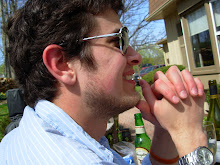 Caputo's What Would Jesus Deconstruct is a really good book for anyone interested in Derridian philosophy and how it might bear on the church. It's quite simple and short but packs a lot of punch. I also love reading books that have great one-liners. Here are a few of my favorite things:
Caputo's What Would Jesus Deconstruct is a really good book for anyone interested in Derridian philosophy and how it might bear on the church. It's quite simple and short but packs a lot of punch. I also love reading books that have great one-liners. Here are a few of my favorite things:“It will be an eye opener to the Christian Right, who, having tried to blackmail us with this question [WWJD], will discover that the slogan they have been wearing on their T-shirts and pasting on their automobile bumpers all these years is a call for radical social justice!” (22).
“The question [WWJD] is tricky, not a magic bullet, because, everybody left or right wants Jesus on their side (instead of the other way around). It requires an immense amount of interpretation, interpolation, and self-questioning to give it any bite – and if it is not biting us, it has no bite – lest it be just a way of getting others to do what I want them to do but under the cover of Jesus” (24-25).
“We sing songs to the truth as if it were a source of comfort, warmth, and good hygiene. But in deconstruction the truth is dangerous, and it will drive you out into the cold” (27).
“The next time we look up to heaven and piously pray “Come, Lord Jesus,” we may find that he is already here, trying to get warm over an urban steam grate or trying to cross our borders” (30).
“The truth will make you free, but it does so by turning your life upside down” (30).
“The religious heart or frame of mind is not “realist,” because it is not satisfied with the reality that is all around it. Nor is it antirealist, because it is not trying to substitute fabrications for reality; rather, it is what I would call “hyper-realist,” in search of the real beyond the real, the hyper, the uber or au-dela, the beyond, in search of the event that stirs within things that will exceed our present horizons” (39).
“The question [WWJD] is tricky, not a magic bullet, because, everybody left or right wants Jesus on their side (instead of the other way around). It requires an immense amount of interpretation, interpolation, and self-questioning to give it any bite – and if it is not biting us, it has no bite – lest it be just a way of getting others to do what I want them to do but under the cover of Jesus” (24-25).
“We sing songs to the truth as if it were a source of comfort, warmth, and good hygiene. But in deconstruction the truth is dangerous, and it will drive you out into the cold” (27).
“The next time we look up to heaven and piously pray “Come, Lord Jesus,” we may find that he is already here, trying to get warm over an urban steam grate or trying to cross our borders” (30).
“The truth will make you free, but it does so by turning your life upside down” (30).
“The religious heart or frame of mind is not “realist,” because it is not satisfied with the reality that is all around it. Nor is it antirealist, because it is not trying to substitute fabrications for reality; rather, it is what I would call “hyper-realist,” in search of the real beyond the real, the hyper, the uber or au-dela, the beyond, in search of the event that stirs within things that will exceed our present horizons” (39).
"To announce the kingdom of God is to bring good news to all those who are poor in spirit and just plain poor, to those who hunger for justice and who are just plain hungry, to those whose minds are blinded by sin and who are just plain blind, to those whose hearts are bent by evil and whose bodies are just plain bent"


